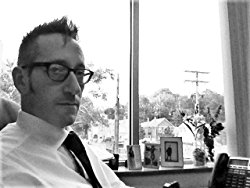Michael Davidow will be featured on Bev Stoddart’s new Zoom event The First Line Dec. 12 at 6 p.m. More information here.
By MICHAEL DAVIDOW, Radio Free New Hampshire
We left home for Thanksgiving this year, to a faraway city. We had not been to this place in a long while, not since our son was born. With him along for the ride this time, though, I was able to see it through new eyes. They say that’s one of the wonderful things about having children: you get to see the world again as if it were brand new. They say it, because they’ve forgotten what it’s like.
I think he enjoyed himself. He got to stay out late, ride the bus, ride the train, and sleep in a hotel. But whenever I caught his glance, and whenever I managed the necessary empathy, I was nearly staggered. Viewed through my son’s eyes, this city made no sense at all. It was rushed and clamorous and meaningless and strange.
I knew its grid myself a bit. And I knew its history, enough to trust it. I knew why its people wore the clothing they did; I knew why its buildings had their special look; I knew when things were built, by whom, and why. For me, this city was like a book, filled with pages to read. I could walk down a street and have some sense of what to expect; I could hop on a bus or take the train with confidence. After more than fifty years on this planet, much of what mankind has accomplished makes a certain sense to me. But that sense is always evolving and being with my son for the week made me wonder what good it is; whether it’s all a product of my own imagination.
If I remember what they taught me in school, you can interpret a text in different ways, with increasing levels of complexity and meaning. You can start with the simple words and what they signify in a concrete way. You can move on to what those words mean in the broader context of the work in which they appear. From there you can ask what they mean in a symbolic sense; whether they have some hidden or metaphorical meaning. And once you have reached that high and abstract destination, you can then return to the words themselves and appreciate them more. There is even a branch of mystical thinking that would have you focus on their shapes on the page, as representing their highest meaning.
My son’s view of this city, in other words, not only contained as much truth as mine. In its pure and stunning grip on the anarchy at hand, it might have even contained more. It was as if he could see the Brownian motion of molecules, while I could only see the clumsy and presumptuous things those molecules were making.
Now I could make a rhetorical stretch right now and ask whether something similar is happening with our nation’s politics these days. It is simple to trace the Trump vote to the Wallace vote, after all, and from there to the Goldwater vote, and from there backwards to Charlie Lindbergh, Father Coughlin, and Henry Ford. You can trace it back to the Great Awakening, I suppose; you can follow the breadcrumbs back to the Roundheads or to Guy Fawkes if you chose. You can view this country from afar, in other words, and see the big sweep of things. Or you can look around and feel lost; feel afraid from feeling lost; and lash out. There is a lot of fear these days and a lot of lashing out.
The problem with fashioning a politics from the emotional truth of feeling lost is that time has currents and social realities are factually rooted things. They have half-lives and after-lives; they have weight and inertia. If you want to chart the future and have it be realistic, then, you need to know both where you’ve been and how you got there. Otherwise your oar will snap at the first stroke in deep water.
It is scary to be lost, and the existential truth that underlies that fear is poorly suited to the political realm. We need our fictions to govern ourselves; we need our narrative structure, which must be coherent and calm.
I felt for my little boy, in this big city filled with rushing bodies and speeding cars and loud trains. He physically stuck to me and my wife more than he had in a long while. Though he had no story of his own in this place, he borrowed ours to get through it. He needed his faith to overcome his fear.
Davidow is the author of Gate City, Split Thirty, and The Rocketdyne Commission, three novels about politics and advertising which, taken together, form The Henry Bell Project, The Book of Order, and The Hunter of Talyashevka . They are available on Amazon and Barnes and Noble. Davidow’s newest book Chanukah Land can be found here.





